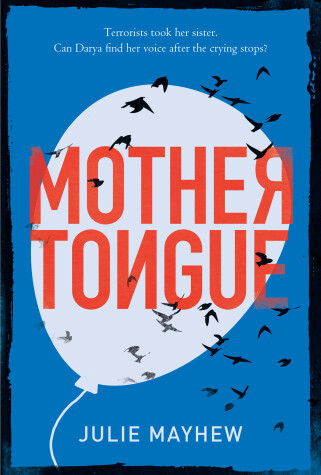Reviewed by Amber (The Literary Phoenix) on
I respect what Julie Mayhew was trying to do with this book, but I don’t think it worked.
Mother Tongue is a fictional account of the family of one of the victims of the Beslan school siege in 2004. I will admit my ignorance – before reading this book, I was entirely unfamiliar with the event. Also, I was 14 and admittedly not following the news. The Beslan school siege was a three-day siege at a Russian school where approximately 1200 people were held hostage on the first day of school for three days. Over three hundred people were killed, half of which were children.
In Mother Tongue, we see the morning before the siege, then the siege itself and the aftermath. From a research perspective, Mayhew’s done an excellent job. The technical aspects are all well done and shocking. The cultural attentiveness is there. What’s missing is the emotion. And I’m not sure if this was a choice – to have the main character so emotionally detached as an affect of shock – or if it was just unsuccessfully written?
I genuinely wish that there were more emotional depths in Mother Tongue. This story is super important to bring to life. The Beslan school siege is not the type of thing that should be forgotten, because it’s tragic and heartbreaking and horrible. But as far as this novel goes, there’s not enough depth to the characters to pull your heartstrings for this particular story. Darya is flat and directionless. There was a point where I thought that the story was going to turn and she was going to grow, but she constantly turned tail and avoided opportunities of growth. That was a theme here – I felt like the storytelling kept stopping short. I couldn’t connect with the characters because they never showed enough of themselves.
As far as the plot goes, its meandering. It’s all about Darya’s healing after the siege and learning to live. She feels guilty for wanting more, and she’s angry at her family for their own types of grief. The book star s strong – getting ready for school and a sister conversation. She doesn’t know what she wants, and the story follows that indecision. As a reader, I felt like I was being lead in circles, and the conclusion was not fulfilling.
Mother Tongue had a lot of idea potential and tells what could be an important story, but I personally did not feel it was told successfully.
Reading updates
- Started reading
- 28 June, 2019: Finished reading
- 28 June, 2019: Reviewed
